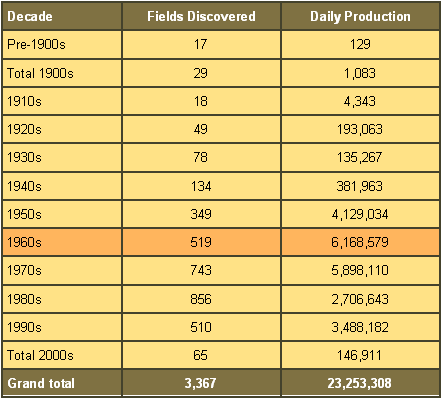It looks like we have hit the plateau of the peak of global oil production
Posted: January 31st, 2009 by: h2
There’s a really good, fairly long, and very in-depth overview of global oil production and discovery numbers
Oil Field Discoveries

This table really says it all in my opinion. But there’s a lot more information in the story, about pretty much every part of the industry you might be curious about.
Just so you understand it, with most global oil fields in decline, at around 5-7% yearly rates, that means, globally, we need to put online about 4-7 million barrels new production per day. Yet, as you can see from this chart, we have added almost no significant new production in the 2000s. This is not a small problem, it’s a very serious issue, and it’s the dead give-away that global peak oil production has almost certainly hit us, now. And what’s left is hard to extract, expensive, and lower quality.
However, it is clear from reviewing a chart of oil prices over the last decade (above) that something else was occurring beneath the surface. The real price driver was largely due to fundamental supply and demand factors. The demand for oil was growing faster than the supply. What was driving demand was that the world economy expanded at its fastest pace in decades, led by explosive growth in emerging market countries. From 2004 to 2007 world economies grew by close to 5% per year with a concomitant growth in oil consumption of 3.9% per year (Interagency Task Force on Commodity Markets, “Interim Report on Crude Oil,” July 2008, p 3).
While demand grew by 3.9% per year, supply struggled to keep pace with demand. Non-OPEC supply growth slowed, OPEC’s spare capacity shrank, and OECD (Organization for Economic Co-operation and Development) oil inventories fell. As a result any new supply disruption from hurricanes, to refinery shutdowns, to geopolitical events, exacerbated an already tight supply chain resulting in price spikes.
Believe me, peak global oil production is here, now. OPEC isn’t dropping their production just because of the drop in oil prices, they are dropping it because to keep pumping at the high levels they were pumping at in the high price period would simply drain them.
They claim and pretend to be dropping just to keep prices up, but I no longer believe this is the case, I believe that all the OPEC countries, including Saudi Arabia, are fully aware of their own decline rates, although some may, like our own major oil companies, actually chose to believe what is more convenient and non-challenging to the status quo. But to the people who must know and understand, I no longer believe there is any real disagreement with what is currently going on.
The IEA, which completed a comprehensive study of 800 producing oilfields, accounting for the bulk of the world’s oil production, began and ended its study with the following conclusion: “The world’s energy system is at a crossroads. Current global trends in energy supply and consumption are patently unsustainable—environmentally, economically, socially…. Time is running out and the time to act is now” (p 37, 49).
If you couple this with a recent Statement from ASPO that oil production peaked in 2008, it’s just not looking so good.
“There are numerous indicators that world oil production peaked in July 2008 at around 87 million barrels per day”, he says.
According to Aleklett there are certainly oil reserves remaining for new production. But only through expensive processes that are not profitable when oil is at today’s price level. Therefore, planned new investments are being mothballed.
“In the 1970s we had a crisis at the gasoline bowser [pump] but the oil reserves still existed. It is a completely different situation today.”
Starting new oil production is not as simple as pressing a button. Instead it is expensive work that often takes many years, says Aleklett.
It sounds as though the oil price is going to rise again?
“The price of oil will go up, but the question is if the demand will be so strong that oil will approach $150 per barrel again. “